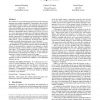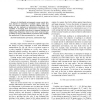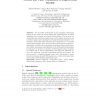640 search results - page 74 / 128 » Logical types for untyped languages |
TLDI
2010
ACM
14 years 6 months ago
2010
ACM
ML modules are a powerful language mechanism for decomposing programs into reusable components. Unfortunately, they also have a reputation for being “complex” and requiring fa...
ICTAI
2009
IEEE
14 years 3 months ago
2009
IEEE
Abstract—In distributed environments, access control decisions depend on statements of multiple agents rather than only one central trusted party. However, existing policy langua...
WFLP
2000
Springer
14 years 19 days ago
2000
Springer
We introduce a framework for assessing the effectiveness of partial evaluators in functional logic languages. Our framework is based on properties of the rewrite system that models...
ISD
1999
Springer
14 years 1 months ago
1999
Springer
The successful development of any geographic information system project needs the careful design and implementation of spatial databases via conceptual and logical data-modeling. T...
ICFP
2009
ACM
14 years 9 months ago
2009
ACM
Functional logic programming and probabilistic programming have demonstrated the broad benefits of combining laziness (non-strict evaluation with sharing of the results) with non-...



